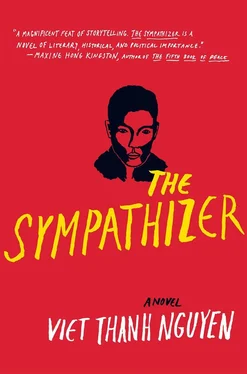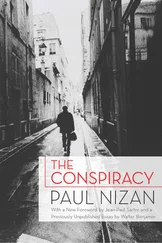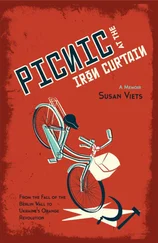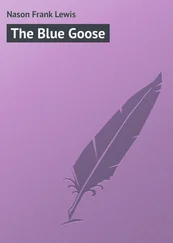Myself and the other secret policemen dutifully wrote this down in our notebooks. Claude was our American adviser, and we expected state-of-the-art knowledge from him and all the other American advisers. We were not disappointed. Interrogation is about the mind first, the body second, he said. You don’t even have to leave a bruise or a mark on the body. Sounds counterintuitive, doesn’t it? But it’s true. We’ve spent millions to prove it in the lab. The principles are basic, but the application can be creative and tailored to the individual or to the imagination of the interrogator. Disorientation. Sensory deprivation. Self-punishment. These principles have been scientifically demonstrated by the best scientists in the world, American scientists. We have shown that the human mind, subject to the right conditions, will break down faster than the human body. All this stuff — again he waved his hand in contempt at what we now saw as Gallic junk, the tools of old world barbarians rather than new world scientists, of medieval torture rather than modern interrogation — it will take months to wear the subject down with these things. But put a sack on the subject’s head, wrap his hands in balls of gauze, plug his ears, and drop him in a completely dark cell by himself for a week, and you no longer have a human being capable of resistance. You have a puddle of water.
Water. Water, James Yoon said. Can I get some water, please?
I fetched him some water. Despite the water cure, he had not actually had any water except what was absorbed through the wet cloth, which was just wet enough, he said, to be suffocating. As his arms were still bound, I slowly trickled the water down his throat. Thanks, he muttered, just as any prisoner would be grateful to his torturer for the drop of water, or the morsel of food, or the minute of sleep that the torturer doled out. For once I was relieved to hear the Auteur’s voice, calling out, All right, let’s get this done so Jimmy can get back to the pool!
By the final take two hours later, James Yoon really was lachrymose with pain, his face bathed in sweat, mucus, vomit, and tears. It was a sight that I had seen before — the communist agent. But that was real, so real I had to stop thinking about her face. I focused on the fictional state of total degradation that the Auteur wanted for the next scene, which itself required several takes. In this scene, the last one of the movie for James Yoon, the Viet Cong, frustrated because of their inability to break their victim and get him to confess to his crimes, beat his brains out with a spade. Being a bit exhausted from torturing their victim, however, the quartet first decide to take a break smoking Pete Attucks’s Marlboros. Unfortunately for them, they underestimated the will of this Binh, who, like many of his southern brethren, whether they be freedom fighters or freedom fighters, was as laid-back as a California surfer regarding every matter except the question of independence from tyranny. Left alone without the towel around his head, he was free to bite off his own tongue and drown under a faucet of his own fake blood, a commercial product that cost thirty-five dollars a gallon and of which approximately two gallons were used to paint James Yoon and decorate the earth. When it came to Binh’s brains, though, Harry had concocted his own homemade cerebro-matter, a secret recipe of oatmeal mixed with agar, the result being a gray, clumpy, congealed mess that he lovingly daubed on the earth around James Yoon’s head. The cinematographer got especially close to capture the look in Binh’s eyes, which I could not see from where I was watching, but which I assumed to be some saintly mix of ecstatic pain and painful ecstasy. Despite all the punishment inscribed on him, he had never uttered a word, or at least an intelligible one.
The longer I worked on the Movie, the more I was convinced that I was not only a technical consultant on an artistic project, but an infiltrator into a work of propaganda. A man such as the Auteur would have denied it, seeing his Movie purely as Art, but who was fooling whom? Movies were America’s way of softening up the rest of the world, Hollywood relentlessly assaulting the mental defenses of audiences with the hit, the smash, the spectacle, the blockbuster, and, yes, even the box office bomb. It mattered not what story these audiences watched. The point was that it was the American story they watched and loved, up until the day that they themselves might be bombed by the planes they had seen in American movies.
Man, not surprisingly, understood Hollywood’s function as the launcher of the intercontinental ballistic missile of Americanization. I had written him a worried letter about the relevance of my work on the Movie, and he had written back his most detailed messages ever. First he addressed my concerns about the refugees: Conditions here exaggerated there. Remember our Party’s principles. Enemies of the Party must be rooted out. His second message concerned my fear of being a collaborator with the Auteur: Remember Mao at Yan’an. That was all, but it disspelled the black crow of doubt sitting on my shoulder. When was the last time an American president found it worth his while to write a speech on the importance of art and literature? I cannot recall. And yet at Yan’an, Mao said that art and literature were crucial to revolution. Conversely, he warned, art and literature could also be tools of domination. Art could not be separated from politics, and politics needed art in order to reach the people where they lived, through entertaining them. By urging me to remember Mao, Man was telling me that my mission with this Movie was important. Perhaps the Movie itself was not terribly important, but what it represented, the genus of the American movie, was. An audience member might love or hate this Movie, or dismiss it as only a story, but those emotions were irrelevant. What mattered was that the audience member, having paid for the ticket, was willing to let American ideas and values seep into the vulnerable tissue of his brain and the absorbent soil of his heart.
When Man first discussed such issues with me, in our study group, I was dazed with his brilliance as well as Mao’s. I was a lycée student who had never read Mao, never thought that art and literature had any relationship to politics. Man imparted that lesson by leading myself and the third member of our cell, a bespectacled youth named Ngo, in a spirited discussion of Mao’s lecture. The Great Helmsman’s arguments about art thrilled us. Art could be both popular, aimed for the masses, and yet advanced, raising its own aesthetic standard as well as the taste of the masses. We discussed how this could be done in Ngo’s garden with blustery teenage self-confidence, interrupted every now and again when Ngo’s mother served us a snack. Poor Ngo eventually died in a provincial interrogation center, arrested for possession of antigovernment pamphlets, but back then he was a boy passionately in love with the poetry of Baudelaire. Unlike Man and Ngo, I was never much of an organizer or agitator, which was one reason, Man would say later, that the committees above decided I would be a mole.
He used the English word, which we had learned not so long ago in our English course, taught by a professor whose greatest joy was diagramming sentences. A mole? I said. The animal that digs underground?
The other kind of mole.
There’s another kind?
Of course. To think of a mole as that which digs underground misunderstands the meaning of the mole as a spy. A spy’s task is not to hide himself where no one can see him, since he will not be able to see anything himself. A spy’s task is to hide where everyone can see him and where he can see everything. Now ask yourself: What can everyone see about you but you yourself cannot?
Читать дальше












